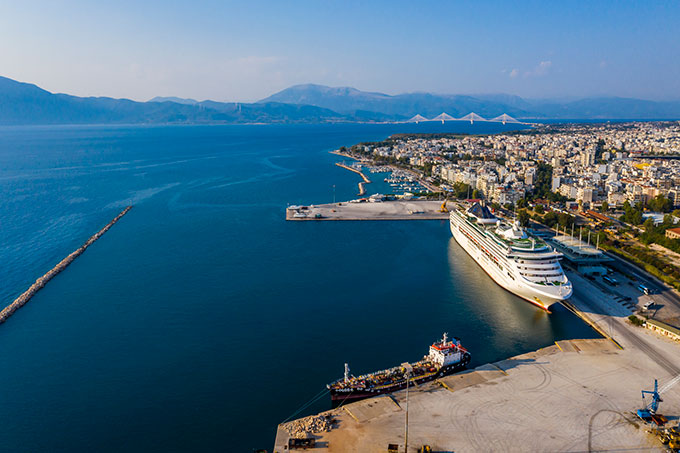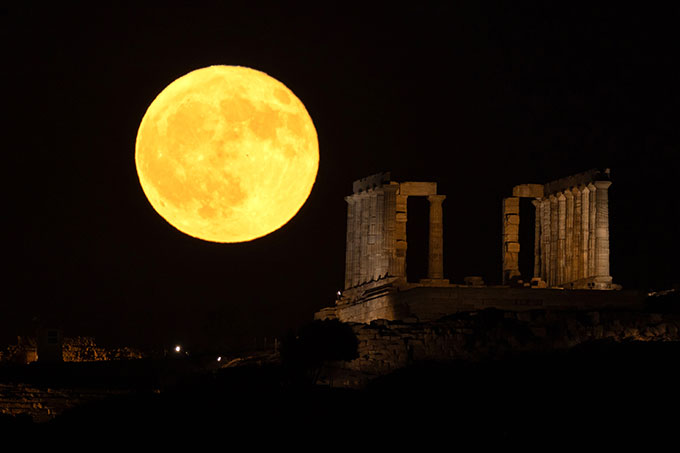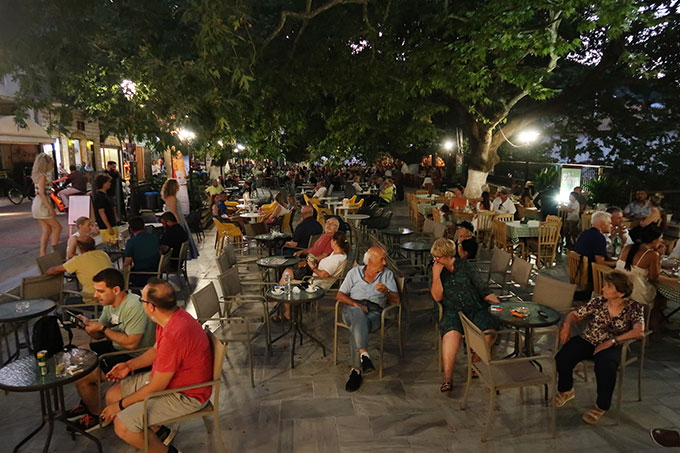My daughter attends a Greek Orthodox Church school whose tradition is to send its eighth-grade classes on a graduation trip to Greece as a capstone to their Hellenic learning. Parents “chaperone” the trip, which is too officious a term for what is really a form of freeriding. (I wasn’t the one who marched down Fifth Avenue in the rain for the Greek Parade every April.) Thus it was that I recently spent a week traveling Southern Greece by air-conditioned coach, listening to dubious pop music, waving at children riding on the backs of farm vehicles, and counting goats. Flying from New York into the heart of a Mediterranean culture is like getting a spiritual rubdown after five rounds of hard meritocratic sparring. It also throws a curious reflected light on the way we live in the United States, a little closer to the tip of modernity’s spear.
We began the trip with several days on the Peloponnese, the leaf-shaped peninsula that hosted the eponymous war between the rival city-states of Sparta and Athens from 431–404 B.C. More than 20 centuries later, the Spartans and the Athenians still speak to us as rival traditions. The Spartans embody the stalwart warrior ethos, the Athenians reason, rhetoric, and beauty. Sparta emerged victorious in The Peloponnesian War, with decisive financial support from the Persian Empire. Thucydides, whose History of the Peloponnesian War is still read by American undergraduates, was an Athenian, a reversal of the mordant truism that history is written by the winners.
Finally, a reason to check your email.
Sign up for our free newsletter today.
I am largely insensible to nature. “New Jersey roadside diner” is a more romantic phrase for me than “Grand Canyon.” It must be said, though, that Southern Greece is strikingly beautiful. Families of ordinary means enjoy sweeping views of the Aegean Sea out their front windows and mountains out the back. The colors seem more saturated; wealth is measured in olive trees. All this beauty might be an impediment to human ambition: How can we expect to improve upon what God has made here? As against this, though, consider what these consoling vistas must mean for quality of life, for cultural continuity, for a people’s sense of rootedness and well-being.
Character forms differently in a place like this, where much of life is conducted outdoors. People tend to be less formal, more attuned to their bodies, less future-oriented. To be young in such a place must be marvelous, even for the poor. But those without money get used up early. Many love this style of living. I was raised in New England, in whose rocky soil Puritanism flourished for two centuries. I unconsciously assume that what feels good is likely to be morally deleterious.
Early on the third morning of the trip, we leave the town of Patras and climb high into the mountains to visit a monastery that has been built directly into a sheer rock face. By Western standards, Greece is an intensely religious country. The Greek Orthodox Church is the state religion, and priests are public employees. Only five monks reside at this monastery; one stands in front as we arrive, densely bearded, silent, watchful. The view from where he stands, leaning against a low stone wall, out into the valley below would stir thoughts of transcendence in a CPA. You do feel, in this place of sanctuary and isolation, that you have briefly left the City of Man and traveled at least some small distance toward the City of God. Even the cheap bracelets my daughter and her friends buy in the gift shop do not entirely spoil this effect for me.

The ancient glories of Greece are embedded in every town, in plaques and ruins and jobs for guides. The sense of the past is strong here. Whether this history provides much moral sustenance in daily life, I do not know. The Greeks certainly seem to feel fortunate that they are Greek. This may have more to do with natural love of patria and with the region’s agreeable climate than with the sanctified names and dates. The Greeks are courteous and patient even as resentment of outsiders is strong with them. Their character resists modernity. A Greek man or woman watching hoi polloi blunder through The Acropolis may be forgiven, perhaps, for feeling that the country is pouring out its mythos a cupful at a time.
Within the broad economic and political consensus of the West, Greece and the United States lie at opposing poles. The United States represents ambition, efficiency, risk, rapid change; Greece represents tradition, artisanship, village life, personal relations. In the United States, dinner takes an hour; in Greece, a substantial family meal eaten at home might mean three or four hours at the table. For Greece to become efficient in the way Americans expect would mean pulling the culture up by the roots. Of course, Greece is an EU member, everyone has an iPhone, and rates of tertiary education have risen dramatically in the last 25 years. You don’t meet many shepherds here. And yet even checking into a tourist hotel in Athens is a more personal, high-touch experience than it is in New York.
The standard of living is lower in Greece than in France and Germany. The nation’s sometimes unsteady economy shows up in the many half-finished houses one sees along the roadside. Building begins, and then an economic shock comes—an inflation spike, an employment crisis—and projects are abandoned in medias res. (Perverse tax incentives also contribute to this pattern.) But when a home is eventually completed, it will be inhabited by a family that eats Sunday dinner together. So there’s that.

Greece was occupied by the Axis powers from 1941 to 1944. We visit Kalavryta, where the Nazis executed almost every male above the age of 12. A simple but effective memorial stands at the massacre site, with the names and ages of the victims etched in stone. For Americans, World War II is resolved in a single, triumphal phrase: “We defeated fascism.” In Europe, war memories are more complicated. Maybe that’s what those old men in the cafes are doing all day, sorting through the facts to assemble a story that gives their nation a place of honor at the heart of things. Every year, my daughter’s school puts on a play for Oxi Day, the October holiday that commemorates Greece’s refusal to give passage to the army of Benito Mussolini. In the Greek telling, this event assumes Stalingrad-sized proportions. As much as Americans, Greeks assume that they are the center and the rest of the world is the fringes.
Greece dominated financial news headlines for a time after the 2008 financial crisis, when it defaulted on government bond payments owed mainly to German banks. Protracted negotiations followed, during which the American press reported on the apparently rich tradition in Greece of not paying one’s taxes. People in Greece do not pay their taxes, it was explained to me by Greek expats, because the government is full of thieves. This seems to me a hard problem to solve, and yet Greece will never function as a successful modern state until it is solved. In America, the tradition is that we do pay our taxes. No dishonor accrues to the person who employs Ivy League tax lawyers to search for ambiguities in the IRS code. So perhaps we are not so different in this regard. The Greeks have universalized a privilege that in America belongs only to the wealthy.
We spend the last three days of our trip in Athens. The feeling is that we have left “deep” Greece for something more generically urban and European. Athens remains burdened by the 2015–16 migrant crisis, , when 1 million migrants entered Greece, mostly Syrians fleeing civil war. Many continued on to other E.U. countries, but about 150,000 people with refugee status remain. Homeless men of Middle Eastern and African origin are visible in the Athens city center. Athens also has a substantial population of Roma, who are effectively excluded from employment and by tireless begging make themselves a public nuisance.
On the ferry from Athens to the island of Aegina to visit the Monastery of Saint Nektarios, we are confronted with scores of Greek teenagers, sharking around in packs of six or eight. Despite the migrant crisis, Greece remains relatively ethnically homogeneous, and these kids all have the familiar Greek look of olive skin, dark hair, and prominent eyebrows. (My Greek-American wife looks like this, so I am all in.) They are not menacing, but neither are they charming. In fact, they are just like American teenagers. Adolescence is its own nationality.
On the last day of the trip, there is trouble. Our flight home is cancelled, and we spend many hours sorting out the arrangements for the new flight before we even pass through customs. Officials huddle around computer monitors, brows furrowed, hands on hips. It seems possible that the Minister for Transportation will have to be summoned, gifts presented, the names of cousins invoked, before blessings are finally given. It is a U.S. carrier that has cancelled our flight, and the problem seems to have originated with bad weather in New York. To my jaded eye, though, the scene is a pantomime of Greek inefficiency.
Finally we are issued new tickets. We wait five or six hours before boarding the 10.5-hour flight back to New York. Naturally, the announcements from the cockpit are made in both English and Greek. After smiling for eight days through speeches and presentations made in a language I do not understand, I am hit with an irrational little fit of xenophobia as we descend. (Most Greeks speak excellent English, which is convenient but also embarrassing to me, since I have not quite mastered even “Yassou,” their most common informal greeting.) But I am a bad traveler—dyspeptic, impatient, and monolingual.

Travel writing is a perennial literary genre, even the essential one, going back to the oral tradition: “I went to a strange land. Let me tell you how they do things there.” Writers cannot resist it because it so effectively flatters our sense that our particular form of consciousness, our sense of what is going by outside the train window, is something the world needs. Readers cannot resist it as a form of vicarious experience. I have never been on the Trans-Siberian Railway, but I have read Paul Theroux’s classic of the genre, The Great Railway Bazaar, and isn’t that the next best thing? In this sense, to deny the pleasures of travel writing seems churlish and scolding.
We should, however, remain appropriately skeptical. Even the best travelers cannot always see what is right in front of them. A week’s stay in a place might even take us halfway in the wrong direction because nations clean themselves up for their visitors, and the truth of how things really work is not easily discerned. We arrange a few stray particulars in our minds and imagine we have made a picture. Most of what I know about Greek culture I learned in Brooklyn, from people who by choice or necessity have left Greece itself behind. My impression, for what it is worth, is this: modern Greece is not especially rich, not especially influential, and not especially politically stable. And yet it goes on being itself. That is far from nothing.
Top Photo: The Temple of Aphaia at Aigina (Loop Images / Contributor / Universal Images Group via Getty Images)
Source link

















